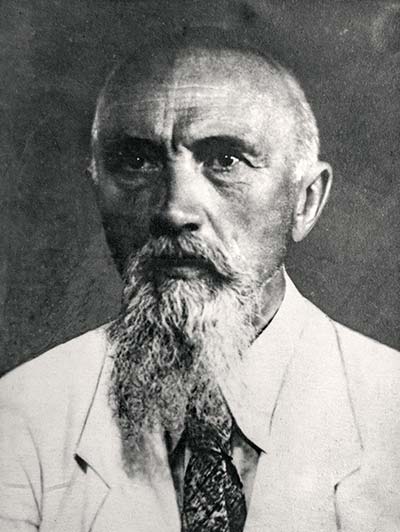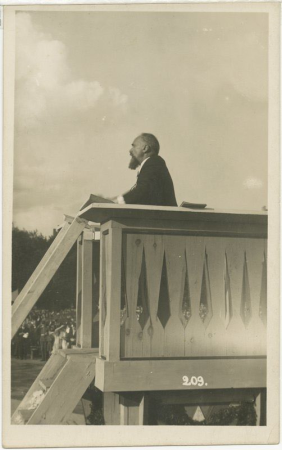Alfrēds Kalniņš
1879–1951
Composer, conductor, organist, pianist, publicist
An outstanding Latvian composer, organist and conductor, composer of the first Latvian national opera Baņuta.
Born 23 August 1879 in Cēsis. Started his schooling at the Bērzaine High School and Miller Realschule, acquired the basics of music in Cēsis, then in Rīga, learning violin, piano and organ. Studied organ and composition theory at the St Petersburg Conservatory (1897-1901).
Kalniņš has a very extensive field of endeavours – he was a conductor, organist, pianist and publicist in Rīga (from 1901), in Pärnu (1903-1911), Liepāja (1911-1915 and 1918-1919) and Tartu (1915-1918). He was head of the Music Department at the Ministry of Education (1919-1921), head of the literary section at the Latvian National Opera, and also worked on the premieres of his operas Baņuta and Salinieki (Islanders, 1920, 1926). At the same time he was the organist at St Jacob’s Church (1921-1923) and musical director of the National Theatre (1923-1925). Throughout his life, composed profusely, organising concerts of his own music and performing regularly as an organist and pianist. Together with Jāzeps Vītols, founded the Latvian Composers’ Group (1923), as well as created and directed the University of Latvia students’ choir Dziesmuvara (Power of Song, 1925-1927).
Member of the Vth All-Latvian Song Festival jury and was organist and concertmaster of concerts, was a chief conductor at the VIth All-Latvian Song Festival and an Honorary chief conductor at the Xth and XIth Song Festivals.
In 1927, he travelled to the United States, where he continued his musical career, provided private lessons, organised concerts of his own music and performed as an organist (1927-1933). On returning to his homeland, he became the organist of the Rīga Dome Cathedral (1933-1944), and in 1944 was appointed rector of the Conservatory of Latvia (1944-1948).
The composer’s range of works is extensive and varied: the operas Baņuta and Salinieki (Islanders), the ballet Staburags, cantatas and other symphonic pieces, instrumental chamber music, original songs and folk-song arrangements.
Officer (1926) and Commander (1937) of the Order of the Three Stars, Homeland Prize Laureate (1939), People’s Performing Artist of the Latvian SSR (1945).

![8.latviešu dziesmu svētki. 60.g. dziesmu svētki [attēls]. Pirmā rindā no kreisās: Teodors Kalniņš, Jāzeps Vītols, Alfrēds Kalniņš, Emilis Melngailis, Teodors Reiters](https://dziesmusvetki.lndb.lv/wp-content/uploads/objects/41650/resized/2resized_thumbnail.png)


![[Alfrēds Kalniņš VIII Vispārējos latviešu Dziesmu svētkos Esplanādē, Rīgā 1933. gada jūnijā]](https://dziesmusvetki.lndb.lv/wp-content/uploads/objects/420159/resized/2resized_thumbnail.png)





